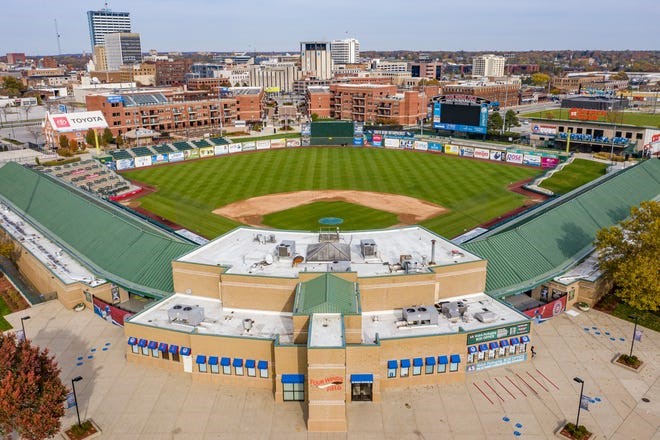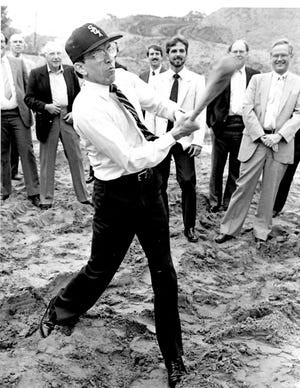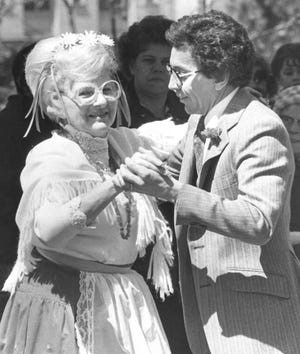Colwell: ‘The meeting that never happened’ hit a home run for South Bend
Jack Colwell July 24,2022
If it were not for a governor’s office meeting that “never happened,” there almost certainly would be no Four Winds Field, no South Bend Cubs, no baseball crowds downtown on summer evenings and no stadium-connected developments around the site.

Although I covered the extra-innings battle in the mid-1980s over building a baseball stadium, I never knew then that the winning run was driven in by Republican Gov. Robert Orr in the meeting that “never happened.”
The secret meeting is disclosed by former South Bend Mayor Roger Parent in his forthcoming book, “Getting Things Done.”
Getting anything done was tough with a “can’t do” attitude lingering from loss of Studebaker auto production. Building a stadium wasn’t just tough, it seemed impossible.
Parent, though not a big baseball fan, was convinced that the opportunity to land a minor league team in a new stadium had tremendous potential for the city. It did, as we now know. But naysayers then abounded.
Opposition was led by a group known as Fair Tax Inc. They were unfair, spreading unfounded rumors of conflicts of interest. They claimed that minor league baseball wasn’t worth watching and predicted a stadium would fail, drawing maybe a couple hundred people on a nice night. The local Republican organization, seeking to smite Parent, a Democrat, supported Fair Tax’s efforts.
Parent struck out in efforts to fund a stadium through a bond issue or through various possibilities for obtaining additional tax revenue.
The last hope was a lease-purchase agreement with a financial institution. But the agreement needed approval from two boards in a Republican state administration, Local Property Tax Control Board and Board of Tax Commissioners.
“These two groups, appointed by a Republican governor, would be under tremendous pressure to vote against the lease,” Parent writes in his book.
On a Friday after work, Parent relates, his city attorney, Rich Hill, suggested a last-ditch idea over pizza, beer and desperation talk at Rocco’s restaurant. The idea: Seek a meeting with the governor. Risky. “If the governor was even mildly supportive, this might favorably dispose his appointees towards our lease proposal,” Parent writes. The risk: “Losing the governor’s support up front could doom the lease even before the board hearings.”
They hired an Indianapolis law firm politically close to the governor to set up a meeting.
The meeting that “never happened” happened somewhere close to the dawn of 1986. Parent doesn’t recall the exact date. There is no record, no news story to establish the date. All agreed that the meeting would be secret. All kept their word.
Parent writes that he was surprised to see that the governor had invited all three state tax commissioners: “Good omen.”
A small group of business and civic leaders, including former Republican Congressman F. Jay Nimtz, presented the case for stadium potential.
The governor and his staff and the tax commissioners asked some questions, Parent recalls, and then: “At the end of our short meeting, the governor said, ‘This appears to be a good project.’ That’s all.”
That’s all they needed. Orr wasn’t going to tell the tax commissioners how to vote. But he signaled that the project, on its merits, appeared to be good and that it wasn’t some political project to be rejected.
“As we left,” Parent writes, “our Indianapolis attorney said, ‘This meeting never happened.’”
The Local Property Tax Control Board, already swayed by the negative outpouring and not at the meeting, recommended that the tax commissioners kill the stadium.
As Fair Tax and the local Republican organization celebrated victory, the tax commissioners voted 2 to 1 to approve building the stadium.
This isn’t a book review. This is a story that I wish I uncovered and reported as construction began in 1986.
It’s a story of a Republican governor helping a Democratic mayor achieve something positive for the constituents of both.
Jack Colwell is a columnist for The Tribune. Write to him in care of The Tribune or by email at jcolwell@comcast.net.



